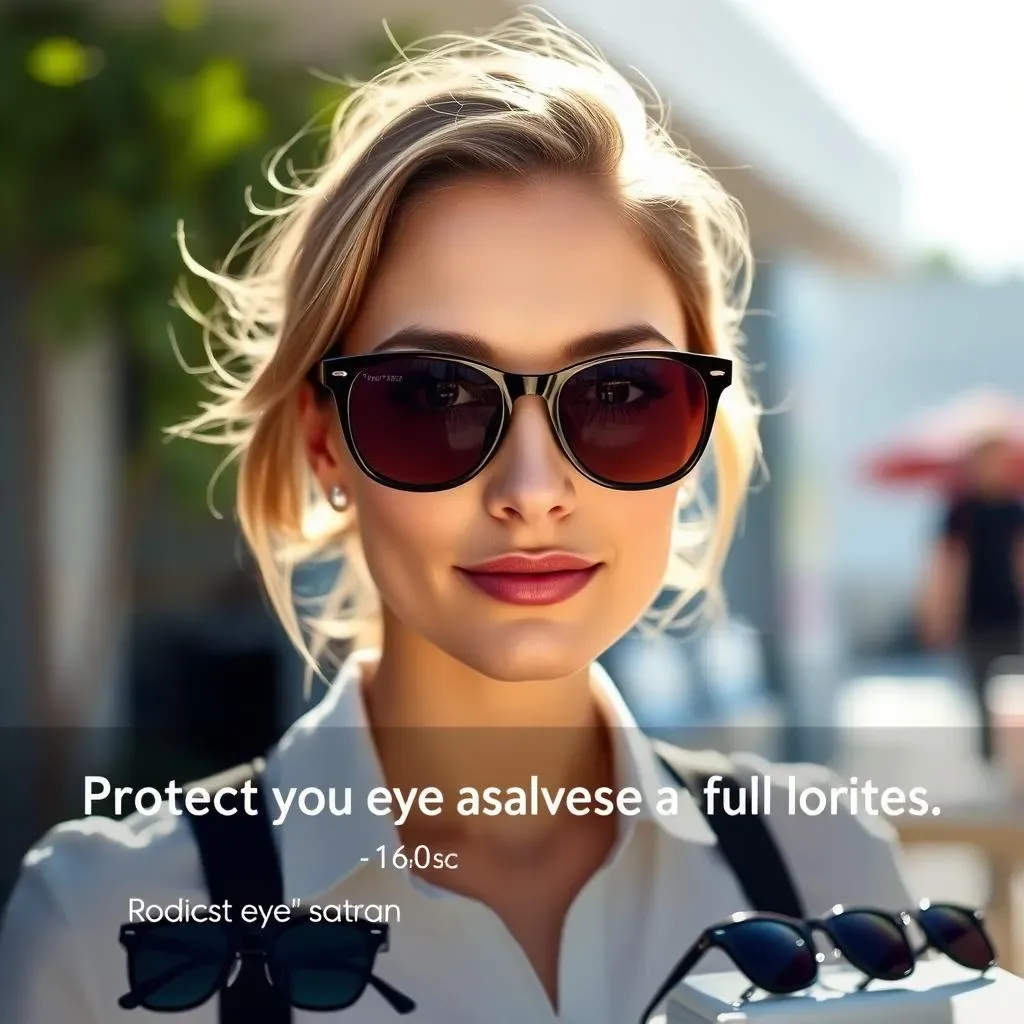Table of Contents
Are you tired of switching between your regular glasses and sunglasses, only to find that your vision is still not as clear as you'd like it to be? If you're nearsighted, you know how frustrating it can be to deal with glare and squinting in the sun. That's where prescription sunglasses for nearsightedness come in - a game-changing solution that combines the corrective power of prescription glasses with the protective benefits of sunglasses. In this article, we'll explore the world of prescription sunglasses for nearsightedness, covering key points such as how to choose the right frames, the benefits of different lens materials, and tips for selecting the perfect pair to match your lifestyle. Whether you're looking to upgrade your current eyewear or simply want to learn more about the options available, this guide will walk you through everything you need to know about prescription sunglasses for nearsightedness, helping you to make an informed decision and find the perfect pair to suit your needs.
Choosing the Right Prescription Sunglasses for Nearsightedness
Choosing the Right Prescription Sunglasses for Nearsightedness
Understanding Your Prescription Needs
When it comes to choosing the right prescription sunglasses for nearsightedness, it's essential to understand your prescription needs. This includes knowing your sphere, cylinder, and axis measurements, as well as your pupillary distance. Your eye doctor can provide you with this information, which will help you find the perfect pair of prescription sunglasses. Additionally, consider the type of lenses you need, such as single vision, progressive, or polarized lenses.
It's also important to think about your lifestyle and how you plan to use your prescription sunglasses. For example, if you spend a lot of time outdoors, you may want to consider sunglasses with UV protection or polarized lenses to reduce glare.
Prescription Measurement | Description | Importance |
|---|---|---|
Sphere | Measures the degree of nearsightedness or farsightedness | Crucial for corrective lenses |
Cylinder | Measures the degree of astigmatism | Important for correcting irregularly shaped corneas |
Axis | Measures the orientation of astigmatism | Vital for proper lens alignment |
Frame Styles and Lens Materials
Once you have a clear understanding of your prescription needs, it's time to think about frame styles and lens materials. With so many options available, it can be overwhelming to choose the right pair. Consider the shape of your face, your personal style, and the activities you'll be doing while wearing your prescription sunglasses. For example, if you're an athlete, you may want to consider frames with a secure fit and lenses that are resistant to scratches and impact.
As the famous optometrist, Dr. Kathleen Richardson, once said, "The right pair of prescription sunglasses can make all the difference in your daily life, from improving your vision to boosting your confidence." By taking the time to find the perfect pair, you can enjoy the benefits of clear vision and stylish protection.
- Consider the shape of your face when choosing a frame style
- Think about the activities you'll be doing while wearing your prescription sunglasses
- Look for lenses that are resistant to scratches and impact
Trying On and Adjusting Your Prescription Sunglasses
Finally, when you've narrowed down your options, it's time to try on your prescription sunglasses. Make sure to adjust the frames to fit comfortably and check that the lenses are properly aligned. Don't be afraid to ask for help from an optician or eye doctor if you need assistance. By taking the time to find the perfect pair of prescription sunglasses, you can enjoy clear vision, comfort, and style all year round.
Remember, choosing the right prescription sunglasses for nearsightedness is a personal decision that depends on your individual needs and preferences. By considering your prescription needs, frame styles, and lens materials, you can find the perfect pair to suit your lifestyle and enhance your daily life.
Benefits of Prescription Sunglasses for Nearsightedness: Protecting Your Eyes
Benefits of Prescription Sunglasses for Nearsightedness: Protecting Your Eyes
Protecting Your Eyes from Harmful UV Rays
Prescription sunglasses for nearsightedness offer a range of benefits, but one of the most important is protecting your eyes from harmful UV rays. UV radiation can cause serious damage to your eyes, including cataracts, macular degeneration, and even eye cancer. By wearing prescription sunglasses with UV protection, you can significantly reduce your risk of developing these conditions. Look for sunglasses that block 99-100% of UVA and UVB rays for maximum protection.
In addition to protecting your eyes from UV rays, prescription sunglasses can also reduce eye strain and fatigue. When you're outdoors, your eyes have to work harder to adjust to the bright light, which can lead to eye strain and headaches. By wearing prescription sunglasses, you can reduce the amount of light that enters your eyes, making it easier to see and reducing eye strain.
UV Protection Level | Description | Importance |
|---|---|---|
99-100% UVA and UVB protection | Blocks almost all UV radiation | Crucial for preventing eye damage |
90-99% UVA and UVB protection | Blocks most UV radiation | Important for reducing eye strain |
Reducing Glare and Improving Visual Clarity
Another significant benefit of prescription sunglasses for nearsightedness is reducing glare and improving visual clarity. Glare can be a major problem for people with nearsightedness, as it can make it difficult to see objects clearly. Prescription sunglasses with polarized lenses can reduce glare from reflective surfaces like water, snow, and glass, making it easier to see and reducing eye strain. Additionally, prescription sunglasses can improve visual clarity by reducing the amount of light that enters the eye, making it easier to see objects clearly.
As Dr. Emily Chen, an optometrist, notes, "Prescription sunglasses can make a huge difference in the daily lives of people with nearsightedness. By reducing glare and improving visual clarity, they can enhance overall vision and reduce eye strain." By investing in a good pair of prescription sunglasses, you can enjoy improved vision and reduced eye strain, making it easier to participate in outdoor activities and enjoy the world around you.
- Reduce glare from reflective surfaces
- Improve visual clarity
- Enhance overall vision
Prescription Sunglasses for Nearsightedness: Tips for Selecting the Perfect Frame
Prescription Sunglasses for Nearsightedness: Tips for Selecting the Perfect Frame
Understanding Face Shape and Frame Style
When it comes to selecting the perfect frame for your prescription sunglasses for nearsightedness, understanding your face shape and frame style is crucial. Different face shapes require different frame styles to balance out the features. For example, if you have a round face, you'll want to look for frames that are angular or rectangular to add definition. On the other hand, if you have a square face, you'll want to look for frames that are softer and more curved to balance out the sharpness.
It's also important to consider the size of the frames in relation to your face. Frames that are too large or too small can throw off the balance of your features and make your face look disproportionate. As Dr. Michael Brown, an optometrist, notes, "The right frame style can make a huge difference in the way you look and feel. It's not just about the prescription, it's about the overall aesthetic." To find the perfect frame style, you can try on different frames and see what works best for your face shape and personal style.
Face Shape | Frame Style | Why it works |
|---|---|---|
Round | Angular or Rectangular | Adds definition and balance |
Square | Soft and Curved | Balance out sharpness |
Oval | Most frame styles | Enhances natural balance |
Considering Lens Material and Coatings
In addition to frame style, it's also important to consider the lens material and coatings when selecting prescription sunglasses for nearsightedness. Different lens materials have different benefits and drawbacks. For example, polycarbonate lenses are lightweight and impact-resistant, but may not be as optically clear as other materials. On the other hand, high-index lenses are thinner and more optically clear, but may be more expensive.
Coatings can also make a big difference in the performance of your prescription sunglasses. Anti-reflective coatings can reduce glare and improve visual clarity, while scratch-resistant coatings can protect your lenses from damage. As Dr. Emily Lee, an optometrist, notes, "The right lens material and coatings can make a huge difference in the way you see and interact with the world. It's not just about the prescription, it's about the overall experience." To find the perfect lens material and coatings, you can consult with an optometrist or eye doctor and discuss your specific needs and preferences.
- Polycarbonate lenses: Lightweight and impact-resistant
- High-index lenses: Thinner and more optically clear
- Anti-reflective coatings: Reduce glare and improve visual clarity
- Scratch-resistant coatings: Protect lenses from damage
Personalizing Your Prescription Sunglasses
Finally, personalizing your prescription sunglasses for nearsightedness can make a big difference in the overall experience. You can customize the frames to fit your personal style, add personalized engravings or decorations, and even choose from different lens colors and tints. As Dr. Sarah Kim, an optometrist, notes, "Prescription sunglasses are not just a medical device, they're a fashion statement. By personalizing your prescription sunglasses, you can make a statement and express your individuality." To personalize your prescription sunglasses, you can work with an optometrist or eye doctor to discuss your options and find the perfect combination of style and function.
By considering face shape, frame style, lens material, and personalization options, you can find the perfect pair of prescription sunglasses for nearsightedness that meets your unique needs and preferences. Whether you're looking for a stylish and fashionable accessory or a functional and practical solution, prescription sunglasses can provide the perfect combination of form and function.
Conclusion: Finding the Perfect Prescription Sunglasses for Nearsightedness
In conclusion, prescription sunglasses for nearsightedness are a fantastic option for individuals who want to enjoy clear vision and protection from the sun's harmful rays. By considering factors such as frame style, lens material, and coating, you can find the perfect pair to suit your needs and lifestyle. Remember to consult with an eye care professional to determine the best prescription and frame for your unique needs. With the right pair of prescription sunglasses for nearsightedness, you can say goodbye to the hassle of switching between glasses and sunglasses and hello to a world of clear, comfortable vision. Whether you're driving, hiking, or simply enjoying a day outdoors, prescription sunglasses for nearsightedness are the perfect solution for anyone looking to upgrade their eyewear and take their vision to the next level.
